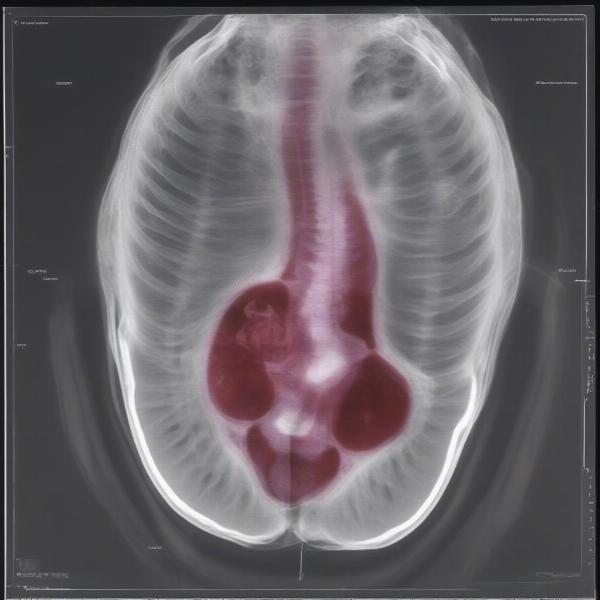A barium study, also known as an upper gastrointestinal (GI) series or barium swallow, is a diagnostic imaging technique used to evaluate the esophagus, stomach, and small intestines of dogs. It involves administering barium sulfate, a radiopaque contrast material, to the dog and then taking X-rays. This procedure helps veterinarians visualize the shape, size, and position of these organs, identify abnormalities, and diagnose various digestive issues. This article provides a comprehensive guide to barium studies in dogs, covering everything from the procedure itself to the interpretation of the results.
What is a Barium Study and Why is it Performed?
A barium study is a non-invasive procedure that allows veterinarians to visualize the upper gastrointestinal tract. Barium sulfate, a white, chalky substance, is mixed with food or water and given to the dog to drink. Because barium is radiopaque, it shows up white on X-rays, providing a clear outline of the esophagus, stomach, and small intestine as it passes through. This helps diagnose problems like foreign body ingestion, tumors, strictures, ulcers, and motility disorders. The study can also help assess the function of the esophagus and stomach.
 Barium Study X-ray of a Dog
Barium Study X-ray of a Dog
Veterinarians might recommend a barium study if a dog is experiencing symptoms like vomiting, regurgitation, difficulty swallowing, abdominal pain, or weight loss. It is a valuable tool for identifying the underlying cause of these symptoms and guiding treatment decisions.
How is a Barium Study Performed in Dogs?
Before the procedure, the dog will typically need to fast for 12-24 hours to ensure the stomach is empty for optimal visualization. The veterinarian will administer the barium mixture orally, either by having the dog drink it or by administering it through a syringe or tube. Several X-rays are taken at different time intervals to track the barium’s movement through the digestive tract. The entire procedure usually takes a few hours, depending on how quickly the barium moves through the system. While generally safe, some dogs may experience mild side effects like constipation or vomiting after the study.
Interpreting the Results of a Barium Study
A veterinary radiologist will analyze the X-ray images to evaluate the size, shape, and position of the esophagus, stomach, and small intestine. They will look for any abnormalities like blockages, narrowing, ulcers, or tumors. The rate at which the barium moves through the digestive tract can also provide valuable information about gastrointestinal motility. Based on the findings, the veterinarian can make a diagnosis and recommend appropriate treatment.
What are the Risks and Side Effects of a Barium Study?
Barium studies are generally considered safe. However, potential risks include aspiration pneumonia (if the barium enters the lungs), constipation, and allergic reactions (though rare). If your dog experiences any unusual symptoms after the procedure, contact your veterinarian immediately.
FAQ
- How long does a barium study take? A barium study typically takes a few hours, including the preparation time and the time it takes for the barium to move through the digestive tract.
- Is a barium study painful for dogs? No, the procedure itself is not painful. However, some dogs might experience some discomfort due to fasting or the administration of the barium.
- What if my dog vomits the barium? If your dog vomits the barium, the veterinarian might need to repeat the procedure.
- Can a barium study diagnose all digestive problems? While a valuable diagnostic tool, a barium study might not be able to detect all digestive issues. Other tests might be necessary.
- What happens after the barium study? Your dog can usually resume normal activities after the study. However, you might need to monitor their stool for a few days and contact your veterinarian if you notice any changes.
Conclusion
A barium study is a valuable diagnostic tool that helps veterinarians evaluate the upper gastrointestinal tract of dogs. While generally safe, understanding the procedure and potential risks is important. If your dog is experiencing digestive issues, consult with your veterinarian to determine if a barium study is appropriate.
ILM Dog is a leading international website dedicated to providing expert advice on dog care and wellbeing. We offer a wide range of resources on topics such as breed selection, health and medical care, training, nutrition, grooming, and much more. Whether you’re a new dog owner or a seasoned expert, ILM Dog is your go-to source for reliable, practical information on all things dog-related. We’re passionate about helping you provide the best possible care for your furry companion. Contact us at [email protected] or +44 20-3965-8624.